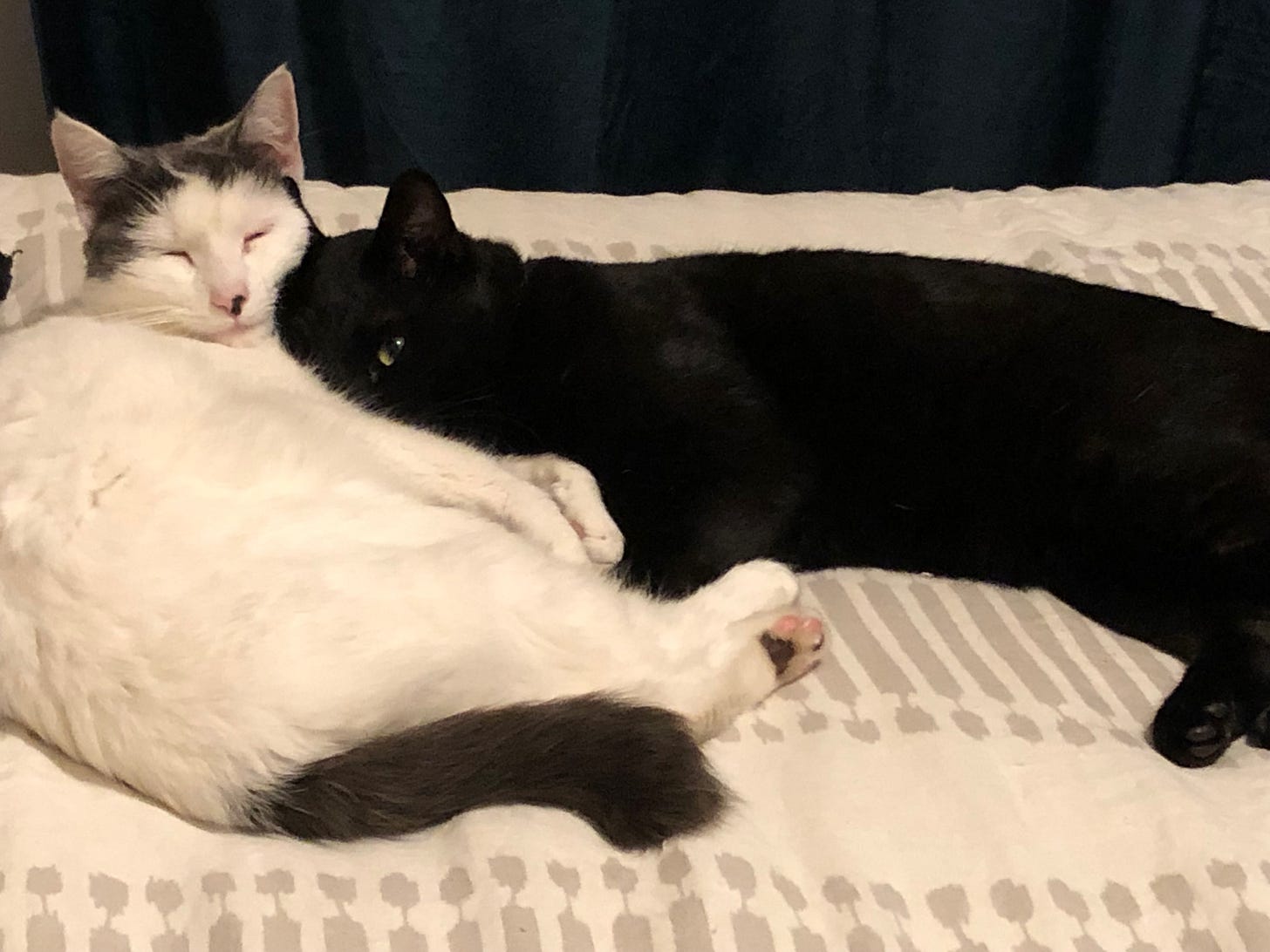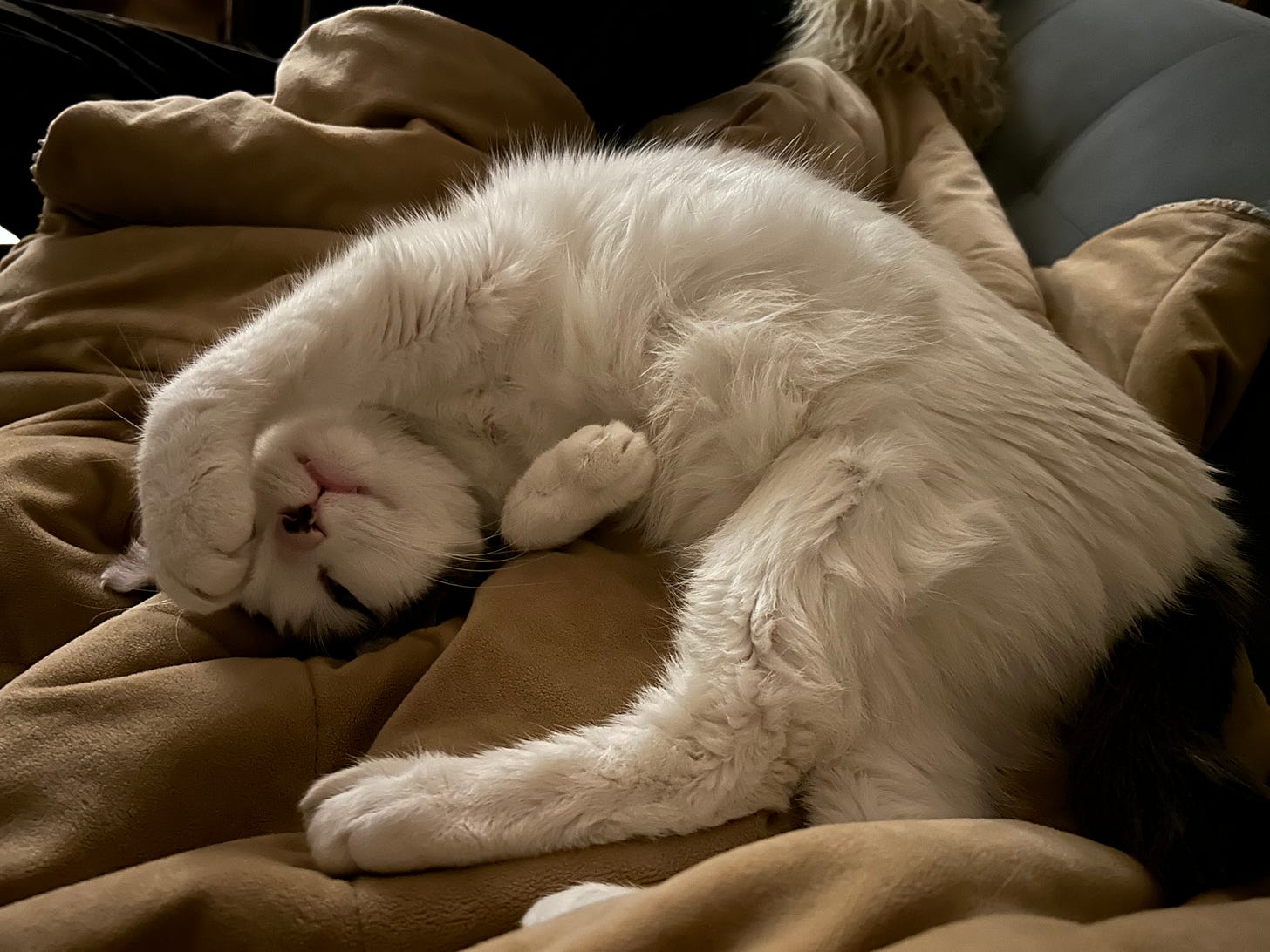Bodies
Can't live with them, definitely can't live without them!
It’s raining hard, and I can hear the steady drumbeat of heavy raindrops on the corrugated plastic roof that shields our deck. The lemon, yucca, and angel’s trumpet trees in our backyard look bright green and vibrant against the dark gray sky. I’m seeing them through the window from the comfort of the couch, where I’m lying under a warm fleece blanket.
Fiona jumps up on my lap. Unlike our cat Sparky, who’s all black, sleek, solid, and muscular, Fiona is a ball of white fluff with a few random splotchy spots that make her look a bit like a tiny cow. Though a friend of ours calls her the supermodel of cats on account of her pretty face, her gait is more akin to waddling than working the runway. She’s also much more skittish than Sparky, who struts around the house like he owns the place; if we make a sudden movement or sneeze too loud, Fiona will bound away as if she were in mortal danger. But when she’s feeling safe, she’s snuggly and affectionate.
Fiona circles around a few times, kneading the blanket, and settles down facing me. I offer her my hand and she washes it thoroughly, one of her favorite things to do and one of the cutest things in the world. When she’s done, she rests her head on the blanket. I stroke her back and she rolls over. That means I get to pet her round belly, running my fingers through her super-soft fur while she purrs contentedly, her front paws in the air. Why is this so satisfying?
I want to dissect cuteness so I can understand it. I want to know why I respond this way to a little ball of fluff. I want to know why, whatever cat we adopt, we grow to love them so completely and above any other cat.
As much as I enjoy this moment with Fiona, I’m unable to be in it fully without also thinking about it. I have to make myself focus on her fur, her stubby tail, her paws, her claws. My mind wants to wander.
I want to know how she’s materialized here with me, in her little body. Why am I baffled by that? I have a hard time believing that this creature and her body are real. It doesn’t help to know that she’s one of over 1 billion cats in the world. It feels crazy to me that there are over 1 billion versions of cats. What makes her Fiona, unique among all of these? What part of Fiona is her little cat body?
It feels crazy to me that there are over 8 billion versions of humans. What makes me me? What part of me is my body?
When I was younger, I couldn’t understand why Western culture had so much trouble with bodies. I couldn’t understand why we thought of the mind and body as separate, or why we elevated the mind above the body. I felt comfortably connected with my body.
Now, I look at my hands and feet and almost feel like they aren’t mine. They’re just these things that I can see, things that travel around with me. My body used to feel like me; now, it’s just a container for me.
Intellectually, I’m as certain as ever that the mind and body are one. I mean, our emotions are controlled and affected by chemicals in our brains and create reactions in our bodies. Evidence of our thoughts and emotions can be seen on MRIs. I know all this, but I’m having a hard time believing it in my bones — despite the fact that the words I just used to express that bring me back to my body.
But not all the way back. I’m having a hard time with bodies, and not just mine. I look at pets and feel like the whole pet we know and love can’t possibly reside only in that little body. I look at other people and feel like their bodies are an illusion.
Why am I feeling this disconnect at this stage in my life?
Mostly, I suspect my feeling of detachment from bodies comes from seeing my aging parents’ bodies fail them so slowly and painfully — and feeling my own body start to decline in annoying ways that hint at future decay. It’s a harsh reality that I was lucky not to have to face in any significant way when I was younger.
Then again, sometimes I wonder if I’m starting to glimpse a larger truth about what lives in us beyond our bodies, what connects us to every other creature. All other living and nonliving things. The rest of the universe.
But is it wishful thinking to hope I’m connecting to some deeper awareness? That seems likely. As wonderful — and important — as it is to feel connected to the universe, we still live in bodies. We still are bodies.
So the challenge is to welcome both: the deeper connection to the universe and a grounded connection to the body. That shouldn’t be so hard; after all, we are stardust. Yet this dual connection seems to elude many of us.
I know I need to make the effort to get more fully into my body. Maybe more hiking would help, when these constant rains let up. If only I enjoyed other forms of exercise! But who am I kidding? Don’t tell me to do yoga or walk barefoot in the dirt, the standard recommendations for feeling more grounded.
How about you? Do you feel disconnected from your body, or from the idea of bodies? Let me know in the comments! Maybe I’ll feel less alone and more connected — if not to the universe, at least to some of the beings in it.




Thank you so much for this one. Thought-provoking! "It’s a harsh reality that I was lucky not to have to face in any significant way when I was younger" got me thinking of my own very early lesson that gave me a deep appreciation of wellness, comfort, and mobility that I feel to this day (age 72). A few years of my life around 29-32 were blighted by back pain that deepened into disability. My search for a solution led me down some common but problematic paths: _be careful< and stop doing anything that might make things worse_ -- and, well, things will got worse, much worse. When I was at a very low point (living with parents again -- thank goodness they were there for me and had room), a wise chiropractor/physical therapist told me "You're hard as a rock, and you need to get moving again" and the Key Words: "You're not fragile!" Being fragile, never getting better, and losing all hope that I ever would, had been my reality for so long! That's when I really began to get my life back. Swimming, walking, then running, and finally weight machines. And many self-care practices both physical and psychological (a profound Trager session, and a wonderful therapist). The earlier chiro who'd said I would never carry a backpack again was wrong. I can't say I'd want to go through it again, given a choice, but in some ways it really was a gift that's informed the rest of my life.
I used to think about writing a book about this . . . maybe I still should. Now I have true aging changes cropping up, but at least no one will lament "But you're so young [to be so afflicted]!"
Once, when I took 'shrooms, I became *intensely* aware of my feet. I ran around saying, "I can feel my feet! I can feel my feet!" probably driving my friends nutty. But it was a profound experience to really have a deep appreciation of this body part that does so much for us. That's my story, and I'm sticking to it.